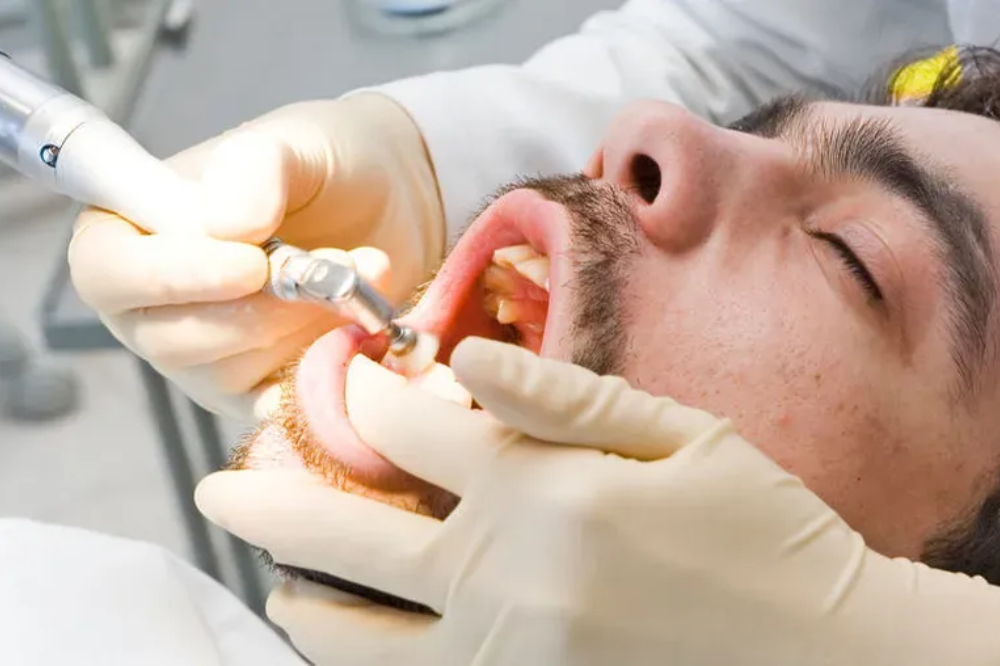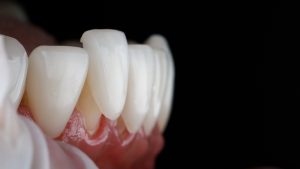Cavities can be very stressful for patients, much like any other dental issue, as oral pain can be very unpleasant. But, no matter how annoyed you may be, the good news is that cavities can be effectively fixed. In case you get cavities in front teeth, you should seek medical assistance from dental professionals as soon as possible. After all, front teeth are the most visible part of your smile; not to mention that you’d want to get rid of pain and tooth sensitivity sooner than later.
What Exactly Is a Cavity?
To put it simply, a cavity is a hole that can develop in your tooth. It’s also known as tooth decay. These holes first appear as rather small spots and then grow larger gradually if you fail to treat them. Developing a cavity is nothing to be too worried about; as long as one has teeth, they can develop cavities at one point or another.
At the very beginning, you might not feel pain or even sensitivity when the cavity just starts forming. Regular dentist appointments can help you discover this issue in time and deal with it accordingly. Of course, the moment you do feel pain and/or sensitivity to hot/cold, it’s crucial to visit your dentist quickly.
What Causes Front Tooth Cavities?
It’s true that cavities are more common to occur in your back teeth than your front teeth. In general, front teeth are easier to clean and thanks to their smoother texture, food remnants rarely get stuck near them. However, that doesn’t mean that front teeth are completely immune to cavities and decay.
One of the main reasons that might lead to the development of front teeth cavities are the sweetened drinks. This includes any type of sweet beverage, not just sodas. The biggest problem can occur at night when you might feel like drinking something sweet after you’ve already brushed your teeth. Many people aren’t aware of the staining and other oral issues that come with beverages. What’s more, even dairy products such as milk and yogurt can be problematic if you don’t brush your teeth afterward.
Other potential causes that could lead to the formation of cavities on front teeth include:
- Poor oral hygiene
- Complete disregard for flossing
- Very frequent consumption of sugary foods and drinks
- Eating disorders
Treatment Options
When cavity treatment is concerned, there are several different options that your dentist might suggest, depending on the severity of your condition. Common treatments include the following:
- Fillings
- Crowns
- Root canal
- Fluoride treatment
Tooth Fillings
The most common way to cure tooth decay is to use fillings in order to fix the hole in the tooth made by the cavity. This is very effective for all teeth, front ones included. You don’t have to worry about hiding your smile due to the old-school silvery-gray fillings. Nowadays, dentists match the color of the fillings to the patient’s tooth, especially if the problem lies on the front teeth. Before they fill in the hole, the dentist will first drill out the decayed material in the tooth.
Crowns
In case your front tooth is suffering from severe decay, fillings might not be a good enough solution to the problem. That said, dentists usually opt for crowns or veneers. Essentially, a crown is a tooth-shaped cap that goes over the decayed tooth in order to replace the existing and damaged crown. A veneer is a thin material made of porcelain that gets fitted over the tooth to smooth out its front surface. Again, it’s necessary to go through the removal process of the decayed material before the actual fixing can begin.
Root Canal
Sometimes, the tooth decay will get so severe that it might lead to your nerves dying out. When this happens, performing a root canal procedure is a common practice as it will allow the dentist to save your decaying tooth.
That said, the dentist will first have to remove the damaged nerves and blood vessels as well as other affected areas in your tooth. Once this is done, it’s necessary to perform an infection checkup and get the proper medication to prevent infections later on. When the root is safe and clean, the dentist will fill in the tooth and use further treatment methods such as crowns and veneers if need be.
Fluoride Treatment
If you’re diligent with your dentist appointments, it’s possible for your dentist to spot the formation of a cavity in its initial stages when you don’t even know it’s there. The best tooth decay treatment, in this case, is a fluoride treatment. Fluoride might be enough to completely stop further decay and actually restore the enamel of your affected tooth.
How to Deal with Pain?
Unfortunately, the majority of people discover a problem with their teeth when cavities are concerned through pain and discomfort. This can be even more unpleasant when your front teeth are affected as you still need to drink. If it happens that you have to wait a while before the dentist appointment, the following solutions can help ease the pain temporarily:
- Your oral hygiene should be on point. You should continue with your routine and brush the problematic areas as normal.
- It’s possible to get some over-the-counter pain relievers as long as your health allows you to take these.
- Be very careful with your diet. You should avoid anything too sugary and spicy. Also, stick to the lukewarm temperature of your foods and drinks. Anything too cold or too hot can aggravate the pain and sensitivity.
Good Cavity Prevention Practices
It’s possible to prevent tooth decay if you stick to some healthy habits and practices. Keep in mind the following:
- Use a fluoride toothpaste
- Brush your teeth at least twice a day, in the morning and before bed
- Do your best to floss in the evening
- Limit your intake of sugary and acidic foods
- Try to snack less
- Visit your dentist for checkups regularly
- Consider dental sealants
It’s also possible to adjust your diet to better your oral health and prevent the formation of cavities, too. For instance, the following foods are a great choice:
- Fruits and veggies that are rich in fibers
- Foods that are rich in calcium
- Green/black tea without sweeteners (these can stain but they also fight decay)
- Fluoride-enriched water
Chewing a sugarless gum could also help with tooth decay prevention, especially if you want to curb your snack cravings in between meals.
In order to maintain your good oral health and a beautiful and confident smile, nothing could possibly replace proper oral hygiene and regular dentist appointments. We at Gables Sedation Dentistry pride ourselves on delivering the top-notch service with exquisite care and attention that our patients deserve. At Gables Sedation Dentistry patients can be 100% sure that they’re treated with the utmost respect and the best equipment available at the time. Thanks to the innovative technologies we employ at our office such as the use of new i-CAT 3D Imaging, our trained specialists can target the problematic areas quicker and with more efficiency, thus minimizing the radiation and time needed to pinpoint the oral issue. Don’t hesitate to get in touch if you want to make an appointment or have any questions about your oral health.










